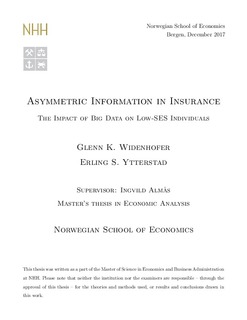| dc.description.abstract | In this thesis, we analyze the effect of big data in insurance markets with heterogeneous
insurance takers. Through a theoretical approach, we consider the effects of increased
information flows on insurance contracts offered to different types of individuals along
dimensions of socioeconomic status and risk. We find that, on a general level, the development
of big data, which is likely to alleviate problems of asymmetric information, will
have unfavourable effects on individuals of low socioeconomic status. These effects arise
due to a social gradient in risk or differences in abilities, or both.
Less asymmetric information leads to more actuarially fair pricing of individuals, holding
each individual responsible for their own risk to a larger extent than before. We assess
this from a normative perspective, and consider redistributory concerns. | nb_NO |
